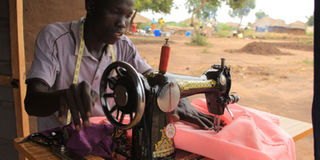Media skills to improve refugees’ lives

Daniel Bidali, one of the refugees tailoring clothes in Bidi Bidi camp. He is one of the refugees from South Sudan benefitting from the skilling programme. Photo by Rachel Mabala
I never knew you could tell a story using a pictures but after training, I have learnt that a picture can tell you a thousand things. I like taking photographs,” an excited 24-year-old Seme Ludanga noted, on the sidelines of a graduation ceremony of the Story Tellers project by the World Food Programme (WFP) in Bidi Bidi camp in Yumbe District.
Bidi Bidi camp, is said to be the second largest camp in the world with an estimated 285,969 refugees.
Ludanga says when his home country South Sudan stabilises, he will be able to tell their stories through pictures, videos and songs.
“For the start, I will be using media such as blogs to tell stories and with time, I will make some money from people who will be reading my content,” he adds hopefully.
According to the WFP’s communications officer Claire Nevill, the Story Teller Project is building communication skills of 34 young refugees, first in Bidi Bidi camp.
“We are training them on how to tell their own stories. WFP thought it is important to build the livelihoods and give career opportunities to refugees who have the opportunity to work and have freedom of movement in Uganda,” Nevill said during a visit to the camp recently.
Giving hope
She adds that the refugees are trained in photography, videography and social media – digital and visual story telling.
“With these skills, they can now tell their stories through photography or videography. In fact some of them would want to be journalists in South Sudan in future,” Nevill says.
She adds that although the project is entirely new, Uganda is the fourth country in the world where it is being tried after Chad, Guatemala and Jordan. “We want to make it a key part of our communication strategy, we want as many people as we serve to be telling their own stories.”
According to United Nations High Commissioner for Refugees (UNHCR), Uganda is home to an estimated 1.4 million refugees, out of which one million are said to be from neighbouring crisis-laden South Sudan. UNHCR works closely with WFP to distribute food relief.
Other districts hosting refugees include Arua with 247,700 and Lamwo with 34,619 refugees, respectively. They are added to the western districts of Isingiro with 108,814, Kamwenge with 76,875, Kiryandongo with 57,202, Hoima with 35,791 and 27,882 in Kyegegwa, where refugees are mostly from Rwanda, DR Congo and Burundi.
Both the UNHCR and government are currently undertaking a verification of the refugee numbers using the biometric system. Inside Bidi Bidi camp which is split into four zones, Nevill says the story tellers’ project has been so far rolled out in Zone 1 but they hoped “that so many storytellers will be champions in the different zones.”
“We want to do it even in other settlements such as Karamoja and in south western region as we work with radio stations to put out their stories,” she added.
A stitch in time
The assistant camp commandant for Bidi Bidi, Benon Kwizera, described the story tellers’ programme as something government has been “yearning for” to equip the youth in camps with skills than playing cards or engaging in crime. He encouraged the graduates to be role models.
“Whether you choose photography, videography or journalism, try to give it your best and be a role model wherever you go,” Kwizera notes. “There is a lot you can do to change your lives and also others to learn from you.”
Kwizera further requested WFP to increase the number of trainees from 34, so that the programme covers “more youth to bridge the massive skills gap”. To qualify for the training, one has to be between 16 and 26, proficient in English and passionate about communication.
Another graduate, 29-year-old Doris Minallah says she had to concentrate on the training because she needs to learn to start making a new life out of the nothingness of being a refugee.
“I am looking forward to seeing this training change my life. I got skills on how to write interesting stories. I want to become a great journalist in South Sudan. I can also use the acquired skills to start a photo studio business,” she says adding that the skills could not be timelier since she left her country jobless. “I was just staying alone and doing nothing at the time.”
With the hopelessness that comes with one leaving all their life and belongings in their country to settle in a camp as refugees, acquiring skills to keep them busy and earn them a living could not come at a better time to refugee youth in Bidi Bidi.




